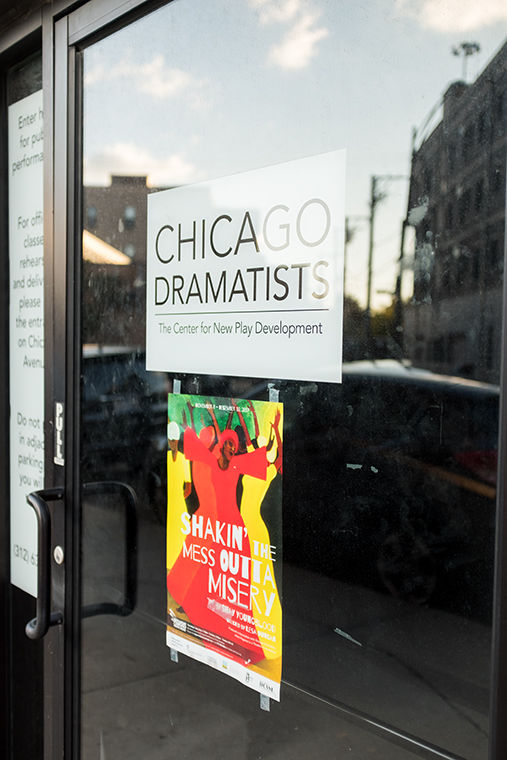Play ‘shakes the mess outta’ 1960’s lack of representation
The exterior of the Chicago Dramatists storefront in West Town, 733 N. Aberdeen. on Nov. 9.
November 13, 2017
A young girl named Daughter was surrounded by a community of black women, some blood relatives and some not, who raised and supported her following her mother’s death in the 1960s American South.
Daughter revisits these memories as a 25-year-old woman in the play “Shakin’ the Mess Outta Misery,” remembering how each of these women touched her life and helped her on her journey to heal.
A Pegasus Theatre Chicago production of the play will run until Dec. 10 at Chicago Dramatists, 773 N. Aberdeen St., where Pegasus is a resident artist.
Ilesa Duncan, Pegasus’ producing artistic director, first produced the show in 1998 with the Chicago Theatre Company and wanted to revisit it for the theater’s theme of “Legacies” for the 2017–2018 season.
“This is going to an era in time and looking at the resilience of these black women,” Duncan said. “[‘Shakin’ the Mess Outta Misery’ is about] how they’ve negotiated their lives in an extremely difficult and oppressive community and how it still resonates with where we are now. Somehow, we are back to negotiating our lives and human rights in a way that probably could surprise some, but for others, it’s felt like it’s always been under the surface and we have not, as a society, addressed it the way it needs to get addressed.”
For Melanie Loren, who plays Daughter, “Shakin’ the Mess Outta Misery” has been her first opportunity to act in an all-black female cast. Loren described it as a “stand-out experience” in her decade-long career.
“I have found it very communal and empowering,” Loren said. “It’s not often that you get to build this whole story with people whose experience … has been similar to yours as a black woman.”
It is also necessary to share black women’s experiences with stories like this one to avoid stereotyping or pigeonholing them, Loren said.
“When people think about what it’s like to be a black woman in the United States of America, they may have certain [preconceptions],” she said, “but what you get to see in this story through the variety of diversity of the characters is that it’s not a homogeneous experience.”
Felisha McNeal, who plays Big Mama, one of the women who helps raise Daughter, said the cast’s age diversity also brings a rare representation to the stage while highlighting the often-overlooked experience of black women’s coming-of-age.
The show’s message reaches beyond age, race and gender divides, exemplifying a human experience that any audience member can relate to because of how specific “Shakin’ the Mess Outta Misery” is in its storytelling, Duncan said.
“It’s a universal story; anybody can relate to it,” she said. “Everyone comes from a mother, and can relish what [that means] whether or not you’re a black woman, or an Asian woman, or a caucasian woman, or a man, because that perspective is universal.”








